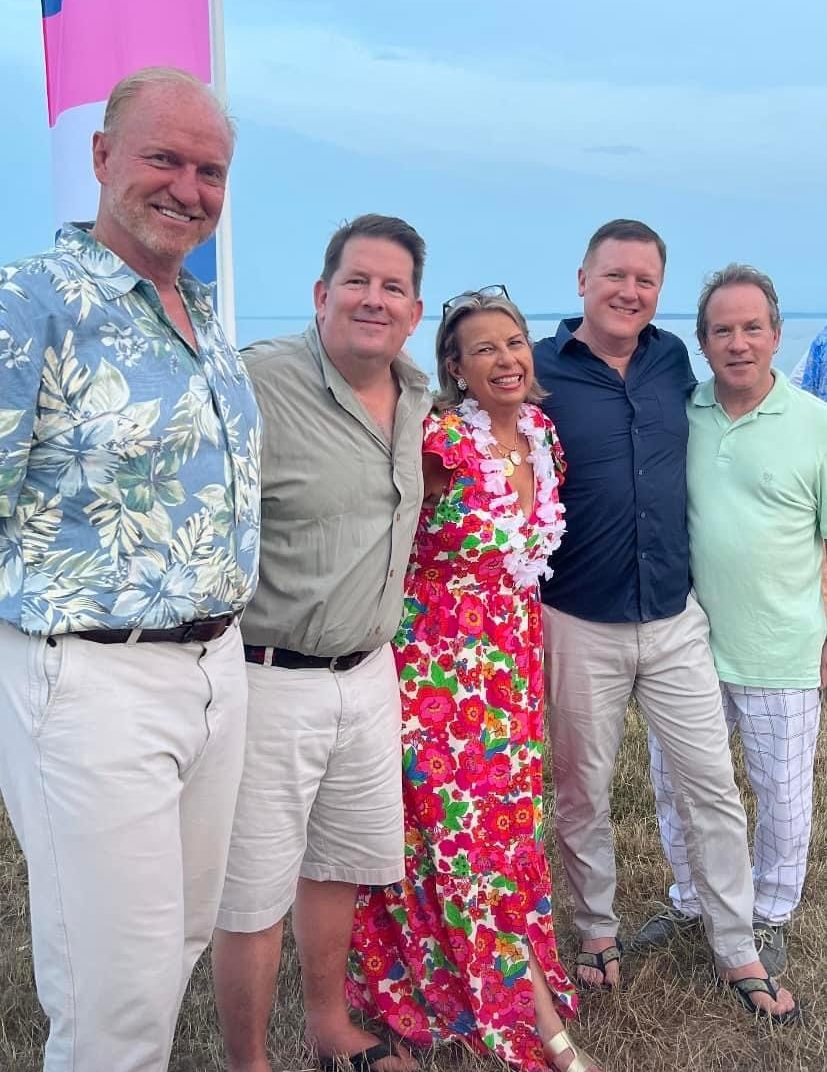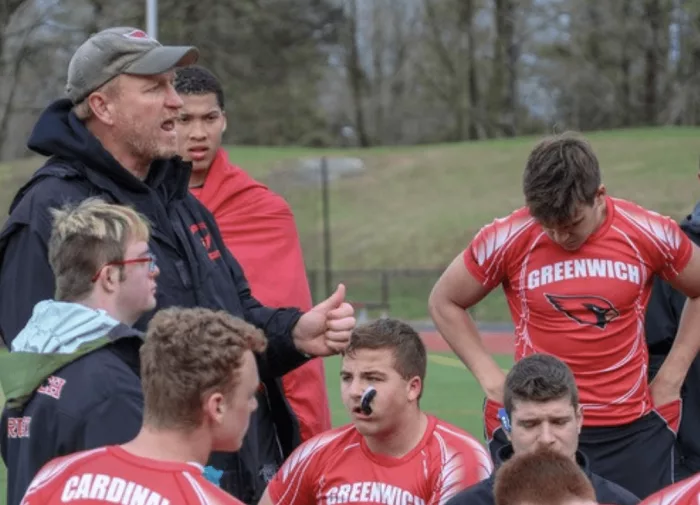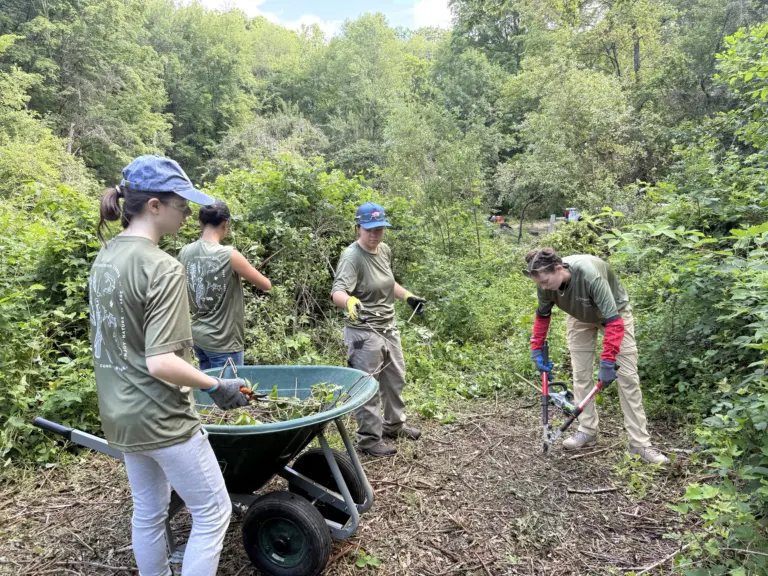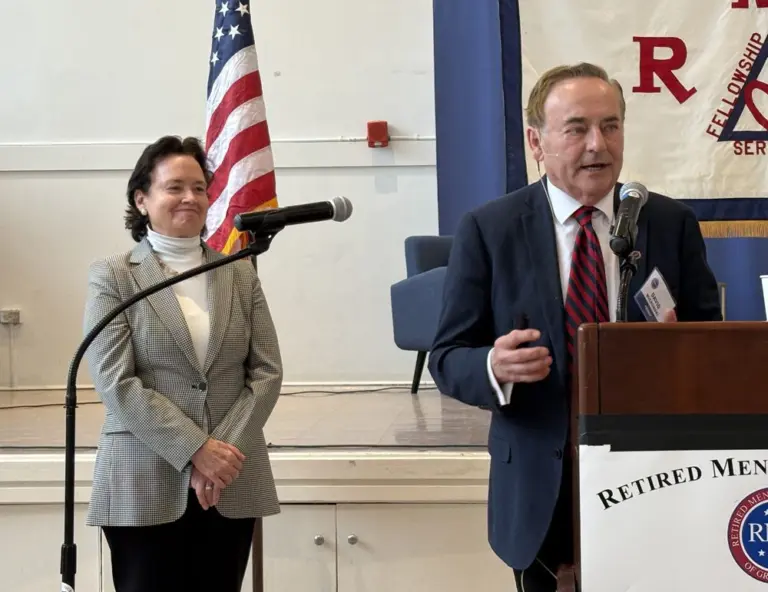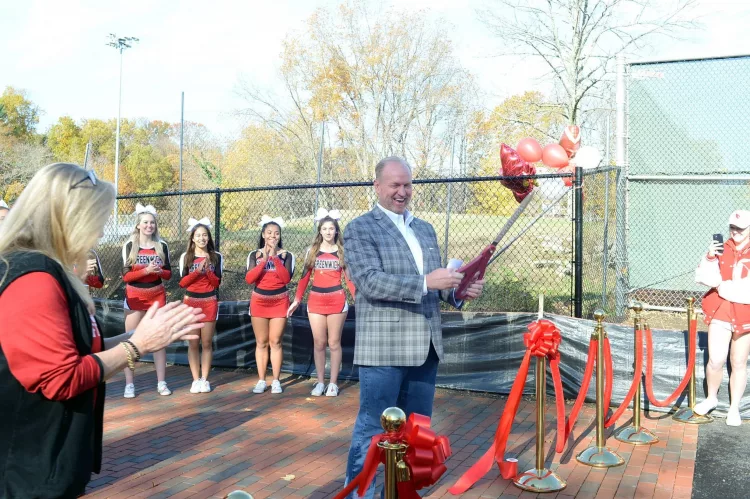
By Anne White
A Quiet Force Behind a Loud Impact
Joe Kelly isn’t easy to sum up. Ask ten people in Greenwich who Joe Kelly is, and you’ll likely get ten completely different answers: the Wall Street veteran, the rugby coach, the volunteer firefighter, the Board of Education leader, the guy who refereed girls rugby, the successful business founder, the boxing coach, the volunteer responder following 9/11.
This year, he is also the tenth recipient of the Sentinel Award, an honor recognizing community members who lead by lifting others while remaining grounded in humility, kindness, and service. Kelly joins the company of past recipients like the first Sentinel, Police Chief Jim Heavey and the other Sentinels, each recognized for putting others before themselves. Kelly, whose resume reads like five lifetimes compressed into one, is a fitting honoree as the award reaches its tenth year.
Queens, Iona, and a Ticket Out
Kelly was raised in Queens, New York, one of six children in a single-parent household after the early death of his father. “We were poor, but we didn’t know it,” Kelly said. “Everyone around us had the same situation.” From paper routes to bartending six nights a week through college at Iona, Kelly embodied the work ethic he would later instill in the countless young people he has mentored.
Though he entered Iona on a track and field scholarship, Kelly gravitated toward rugby, a sport that would later form the core of his community contributions in Greenwich. But finance was his degree, and Wall Street was his destination.
Tokyo, London, and a Career in Overdrive
After securing an early job in the back office of a Wall Street firm, Kelly quickly moved up the ranks, eventually volunteering to help open a Tokyo office in the 1980s—an opportunity few others wanted.
Once there, Kelly and his colleagues had to build the operation from the ground up. There was no office space, no client base, no infrastructure. “It was soup to nuts,” he said. They secured real estate, recruited clients, handled regulatory issues.
The experience was intense. Despite the pressure, he found the experience exhilarating. “It was a baptism by fire,” he said. “But we built something real, and I learned how to run and scale a business from the ground up.”
With his future wife Jill remaining in the U.S., the two sustained their relationship long-distance for two years, with only one visit in between. “We tested our relationship living as far apart as two people can,” he said. They passed the test. When Kelly returned, he brought with him not only a deepened commitment to Jill, but also the confidence and experience of someone who had succeeded in a highstakes international challenge.
He later relocated to London, where he helped grow a trading operation that went from ten people to more than 250. By then Kelly had married Jill and by the end of their eight years abroad, they were parents to three children.
When they returned to the United States in 1998, it was Jill who chose the place they would finally call home. “She said she’d stay three more years in London if she could choose anywhere she wanted to live. She chose Greenwich.”
Unemployment as a Gift
Upon returning, Kelly was contractually barred from working for two years under a non-compete agreement. “I was given a lucrative package, but I couldn’t have so much as a paper route,” he said. With his usual outlet—”being a workaholic”—cut off, Kelly was forced to do something he came to cherish–find balance.
The adjustment was jarring. “I went from full speed to zero overnight,” he said. “It was purgatory.”
Yet in that forced stillness, something shifted. Stripped of work, Kelly turned to family and community. He spent time with his young children. He started volunteering—coaching youth soccer, football, basketball, and eventually rugby. He discovered that the sense of purpose he had once found in business could also be found on a field, helping a kid improve his game or mentoring a young athlete off the field.
“I realized I could still work hard, but in a different way,” he said. “I didn’t need to chase deals 24 hours a day to feel fulfilled.” That recalibration changed everything. When his noncompete expired and he reentered the professional world, he did so with new clarity. He could still build companies, invest in complex ventures, and lead teams—but he could also keep balance. Work matters. So does family. So does community.
From that pause came what would become a defining era. “That’s when Coach Kelly began,” he said.
From Fields to the Boardroom to Ground Zero
Professionally, Kelly returned to Wall Street and worked at Cantor Fitzgerald in 2000. A disagreement with leadership led to his departure in the summer of 2001. Weeks later, the company’s offices were destroyed in the September 11 attacks. “I had friends, my brother, my sister-in-law working there,” he said. “They left with me. At the time I thought the worst thing had happened. It turns out it saved our lives.”
Kelly was downtown when the planes hit. “I walked to the towers. I was under the second tower when it was hit,” he said. After evacuating and returning to Greenwich, he joined his brother and returned to Ground Zero. “We did search and rescue for three days,” he said. That experience led him to become a firefighter with the Amergerome Fire Department, where he responded to local calls for ten years.
Coaching State Champions, Protecting Girls on the Field
Later, Kelly took over the Greenwich High School rugby program. “Coach Lapham was stepping down. He said, ‘I can find someone to coach, but not someone to continue the culture,’” Kelly recalled. “That meant something to me.” Kelly led the team to nine state championships in ten years.
“I saw kids being left out. I made sure everyone had uniforms, that no one was left off a trip because they couldn’t afford it,” he said. He and Jill organized fundraisers and quietly covered costs for athletes without means. “It wasn’t sustainable, they told me,” he said. “But we made it sustainable—because we built a culture around it.”
Today, the Greenwich High School rugby program is led by Joe Kelly Jr. who had gone on to play professional rugby for three years—an experience that deepened his technical mastery of the game. Under his guidance, the program has regained its competitive edge, earning a return to the state championship this season for the first time since his father coached.
“Joe Jr. brings a sharper technical eye than I ever had,” Joe Sr. said. “But more importantly, he brings the same heart.”
Equally meaningful to the original Coach Kelly was a budding girls rugby program. Kelly ensured they had support and a coach as a club and, in 2019, when they achieved official varsity status, he shepherded their first few games as a referee. It wasn’t a formality—it was a safeguard. Rugby, unlike many other sports, has no rule differences between boys and girls.
“In rugby there are 30 athletes on the field and one referee. It can get very hectic.” Kelly explains. “I needed to make sure the game was safe, fair, and respected. I wasn’t going to leave that to chance.” By stepping in as referee, he protected the athletes, set the tone for the program, and sent a clear message: the girls team mattered just as much as the boys. This spring, six years later, 60 girls turned out for rugby—testament to the inclusive and safe program he helped build.
Service on the Board of Education: Turning Defense into Offense
Joe Kelly joined the Greenwich Board of Education not by ambition, but by request. Originally tapped to run alongside Fred Camillo as Selectman, Kelly agreed to step aside when the RTC asked him to switch places with Lauren Rabin in order to help balance the ticket. “Whatever you guys need,” he said at the time. “Each one, I could just apply myself and have a ton of fun with.”
Once on the Board, he approached the work with the same energy and organizational clarity he had used in business. What struck him most was how often people in the system were forced to play defense—protecting their positions, avoiding risk— rather than being empowered to lead or innovate. “If you could somehow grab a group and say, ‘I’m going to protect you,’ then they could go on offense,” he said. “Even if it’s small things, you can accomplish a lot.”
During his tenure, Kelly helped create what many called the most collegial and bipartisan board in recent memory. “People think they have to fight. But if you bring everyone together, your productivity becomes exponentially greater,” he said. “You don’t have to worry about getting stepped on or embarrassed. You can just roll up your sleeves and get to work.”
Kelly’s ability to absorb political heat—what he described as “jumping on the hand grenades”— allowed others on the Board to focus on improving the schools rather than navigating constant conflict.
“It was simple stuff,” he said. “But it’s hard to ask people to volunteer their time when it gets ugly. I don’t mind. I come from the open outcry markets. You scream and yell all day, so nothing gets to me. It bounces off.”
He found the experience not only worthwhile, but deeply satisfying. “I told Lauren Rabin later, I’m so glad we switched. I would’ve loved working with Fred, but the Board of Ed was more rewarding,” he said. “Because the beneficiaries of the time and effort were the kids.”
Reading People, Not Pages: Living with Dyslexia
Joe Kelly didn’t grow up knowing he had dyslexia. He just knew reading didn’t make sense the way it seemed to for others. “You used to have to hide it,” he said. “People thought you were stupid if you couldn’t read.” So he adapted. “I’d look at a sheet of paper and couldn’t read it, but I’d watch the person who gave it to me. I’d read their expressions, their tone, their face—just to figure out what they were trying to say. That’s how I learned to get information.”
For years, he masked the difficulty. “On the Board of Ed, I’d memorize what I was going to say,” he explained. But the moment of change came during an RTM meeting, when he was unexpectedly asked to read a resolution out loud. “They handed me the thing, and I was standing at the podium in front of 230 people. I looked down and I just said, ‘I’m dyslexic, so I can’t read this off the cuff.’”
Afterward, several people approached him—some with dyslexia, others with kids or grandchildren facing it. “They told me it helped to see someone successful struggle with the same thing,” he said. “I said, ‘You have nothing to worry about. They just learn to cope, and they’ll be fine.’”
Kelly also pointed out that many high achievers have managed dyslexia. “Richard Branson from Virgin Atlantic has it. Mr. Wonderful from Shark Tank has it,” he said. “What you do is learn coping skills. For me, I learned how to read people instead of paper.” Today, Kelly speaks openly about it, not to draw attention, but to make it easier for others to talk about their own challenges. “Back then, you couldn’t say anything. Now it’s more accepted,” he said.
Over the past decade, the Greenwich Sentinel Award has become one of the town’s most meaningful honors—not because of fanfare, but because of the character it recognizes. Police Chief Jim Heavey, the inaugural recipient in 2016, set the tone with a lifetime of steady, visible, and compassionate leadership. Rev. Jim Lemler (2017) stood beside those who needed a voice. Susan Wohlforth (2018) championed women and nonprofits with equal passion. James McArdle (2019) preserved both legacy and livelihood as a fourth-generation steward of his family business, while offering mentorship and guidance quietly to others behind the scenes. Pamela Pagnani (2020) brought relentless energy to the service of others, always the first to say yes and the last to seek credit. Stephanie Dunn Ashley (2021) gave her time, talent, and deep compassion to every kind of emergency response and anyone who needed help. Bob Capazzo (2022) never missed a moment—photographing the town, while also lifting spirits and cheering us all on in his understated way. Frank J. Gaudio (2023) carried businesses and families through the pandemic with tireless determination, working with his team through sleepless nights for weeks. And Stephen Walko (2024) set a tone of fairness and trust in public service, with a remarkable talent for effectiveness and never forgetting the human element behind every decision. Each of them continues to answer the same call: to help, to show up, and to serve without fanfare. The award is not for prestige. It is for presence. It honors not those who stand out, but those who stand up—consistently, compassionately, and without condition.
Next Week: Coach, Counselor, Community Builder
In Part Two of our profile, we’ll explore Joe Kelly’s local leadership as a public servant, his unexpected boxing matches (including one alongside his wife, Jill), and more. Join us to celebrate Joe on June 26! Visit www.GreenwichSentinel.com for information.
